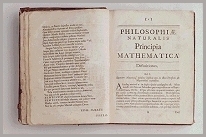Doğal
Felsefenin Matematiksel İlkeleri —
(Kitap 3, Evrenin Dizgesi, 1713’te yazılan ‘‘Genel
Not’’tan pasaj) |
Mathematical
Principles of Natural Philosophy —
(General
Scholium) |
| Ve şimdi tüm kaba
cisimlere yayılan ve onlarda gizli yatan belli bir çok ince tin üzerine
birşeyler ekleyebiliriz; ve bu tinin kuvveti ve eylemi yoluyla cisimlerin
parçacıkları yakın uzaklıklarda birbirlerini çeker, ve eğer bitişik iseler,
birbirlerine tutunurlar; ve elektriksel cisimler komşu cisimcikleri çekerek
olduğu gibi iterek de daha büyük uzaklıklara etkir; ve ışık yayılır,
yansıtılır, kırılır, saptırılır ve cisimleri ısıtır; ve tüm duyum uyarılır,
ve hayvan bedenlerinin üyeleri istencin buyruğu üzerine, eş deyişle, bu
tinin sinirlerin katı lifçikleri boyunca karşılıklı olarak dış duyu örgenlerinden
beyne ve beyinden kaslara yayılan titreşimleri yoluyla devinir.
Ama bunlar birkaç sözcükle açıklanamayacak şeylerdir, ne de bu elektriksel
ve esnek tinin işlemesini sağlayan yasaların doğru bir belirlenimi ve
tanıtlaması için gereken yeterlikte deneylerimiz vardır.
|
And now we might add
something concerning a certain most subtle spirit which pervades and lies
hid in all gross bodies; by the force and action of which spirit the particles
of bodies attract one another at near distances, and cohere, if contiguous;
and electric bodies operate to greater distances, as well repelling as
attracting the neighboring corpuscles; and light is emitted, reflected,
refracted, inflected, and heats bodies; and all sensation is excited,
and the members of animal bodies move at the command of the will, namely,
by the vibrations of this spirit, mutually propagated along the solid
filaments of the nerves, form the outward organs of sense to the brain,
and from the brain into the muscles.
But these are things that cannot
be explained in few words, nor are we furnished with that sufficiency
of experiments which is required to an accurate determination and demonstration
of the laws by which this electric and elastic spirit operates.
|
| Doğal Felsefenin Matematiksel İlkeleri — DEVİM BELİTLERİ, YA DA YASALARI — Not |
Mathematical Principles of Natural Philosophy — AXIOMS, OR LAWS OF MOTION — Scholium |
| Ve aslında eğer o ağırlıklar
eşit olmasalardı, direnç göstermeyen etherde yüzmekte olan bütün yeryüzü
daha büyük ağırlığa boyun eğecek, ve, ondan geri çekilerek, sonsuza sürüklenecekti.
|
And indeed if those
weights were not equal, the whole earth floating in the nonresisting ether
would give way to the greater weight, and, retiring from it, would be carried
off in infinitum. |
| Doğal
Felsefenin Matematiksel İlkeleri — KİTAP
ÜÇ— Evrenin Dizgesi — YERÇEKİMİ ÜZERİNE — Önerme 6 |
Mathematical
Principles of Natural Philosophy — BOOK
THREE — The System of The World — ON GRAVITY — Proposition 6 |
| SONURGU 2. Evrensel olarak, dünyanın çevresindeki tüm cisimler yerçekimi ile dünyaya
doğru çekilirler; ve dünyanın özeğinden eşit uzaklıklarda tümünün ağırlıkları
tek tek kapsadıkları özdeğin nicelikleri ile orantılıdır.
Bu deneylerimizin
erimi içersindeki tüm cisimlerin niteliğidir, ve dolayısıyla (3. Kurala
göre) ne olursa olsun tüm cisimler için doğrulanacaktır.
[Aristoteles
Ve Descartes’ın Özdeksel Ether Kuramlarına Karşı:] Eğer ether,
ya da herhangi bir başka cisim, ya bütünüyle yerçekiminden yoksun olsaydı
ya da kendi özdek niceliği ile orantılı olarak daha az yerçekimi uygulasaydı,
o zaman, Aristoteles, Descartes ve başkalarına göre onunla
başka cisimler arasında yalnızca özdek biçiminden başka hiçbir
ayrım olmadığı için, biçimden biçime bir ardışık değişim yoluyla, sonunda
kendi özdek nicelikleri ile orantılı olarak en çok yerçekimi uygulayan
cisimlerle aynı durumdaki bir cisme değişebilirdi; ve, öte yandan, en
ağır cisimler, o cismin ilk biçimini kazanarak, derece derece yerçekimlerini
yitirirlerdi.
Ve buna göre ağırlıklar cisimlerin biçimlerine bağımlı
olur, ve o biçimlerle birlikte değişebilirlerdi—önceki Sonurguda tanımlanmış
olana aykırı olarak.
|
COR.
II. Universally, all bodies about the earth gravitate toward the earth;
and the weights of all, at equal distances from the earth’s center, are
as the quantities of matter which they severally contain.
This is the
quality of all bodies within the reach of our experiments, and therefore
(by Rule 3) to be affirmed of all bodies whatsoever.
If the ether, or
any other body, were either altogether void of gravity or were to gravitate
less in proportion to its quantity of matter, then, because (according to
Aristotle, Descartes, and others) there is no difference between that and
other bodies but in mere form of matter, by a successive change from
form to form, it might be changed at last into a body of the same condition
with those which gravitate most in proportion to their quantity of matter;
and, on the other hand, the heaviest bodies, acquiring the first form of
that body, might by degrees quite lose their gravity.
And therefore the
weights would depend upon the forms of bodies and, with those forms, might
be changed, contrary to what was proved in the preceding Corollary.
|
|
